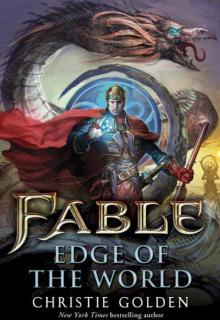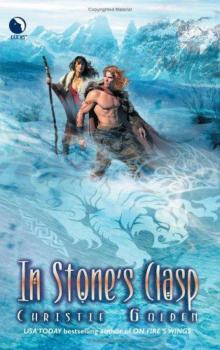- Home
- Christie Golden
In Stone's Clasp Page 2
In Stone's Clasp Read online
Page 2
It looked just like any other scrap of cloth, but then his hand closed on it and he gasped. Slim, strong fingers, rough from working in the fields and forest since childhood, had never before touched something this soft. It was…he couldn’t think of any words to describe it.
Gently he untangled it with one hand. It came loose easily, and now he saw that it was more than simply white—it seemed to have the soft glow of the moon about it. Slowly, his heart racing, Jareth brought it to his face and inhaled its scent deeply.
Summer. This one had been woven in summer. He smelled the fragrance of soft breezes, flowers, good clean earth, all manner of fresh and growing things. It was unbelievable—this overwhelming scent of summer in the middle of winter.
They were real. The blessing cloths were real. That meant that the selva were real, and the taaskali, and—
“Did you find it?”
Jareth started from his reverie. He stared at the cloth. He couldn’t possibly bring this down and give it to Larr, who would shove it in his pouch along with his knife, interesting bits of bone and dried meats and whatever else his friend felt like carrying. He couldn’t have this brought out and showed around, an object to elevate himself and Larr in the eyes of their friends. This cloth was more important than that. It had a task—to bring blessings everywhere across Lamal. It was never made to be crumpled into a boy’s pouch like a skipping stone.
Jareth made his decision. He shifted his grip slightly for better purchase. When a breeze stirred his long blond hair, Jareth threw the piece of cloth as far up as he could. The zephyr gladly took it, and Jareth could have sworn he heard the cloth…singing. He watched as it danced away and vanished from sight.
“I’m coming down,” he called to his friend, not answering the question. Jareth was not looking forward to the inevitable confrontation but was secure in the knowledge that he had made the right decision. The thought of that beautiful blessing cloth crumpled and dirty made him feel slightly sick.
He had made it to the last branch and was about to jump down to the ground when he heard a loud crack. The limb broke beneath him and Jareth landed hard.
Larr helped him to his feet, laughing as Jareth gasped for air like a fish out of water. “You’ll be all right,” Larr chuckled, slapping his friend on the back. “But so much for all your bragging about climbing trees. So, where is it?”
Jareth got to his feet, wincing a little. “I let it go.”
“What?”
“That’s what you’re supposed to do,” Jareth said firmly.
“You didn’t even show it to me?”
Jareth hesitated, then said, “You said you wanted to keep it. I took you at your word. And it…Larr, it just wasn’t meant for keeping. I can’t explain it any better than that. I had to let it go.”
While Larr fumed silently, Jareth turned to look at the betraying limb. It was a bit taller than he, slightly thinner than his arm. A thought occurred to him as he picked it up.
“I could make a staff out of this,” he told Larr.
Larr frowned. “I want a staff too,” he said. Jareth looked at him searchingly. Larr had already begun to forget about the blessing cloth and all that it meant. Now he wanted a staff. Jareth smiled.
“Then let’s go find you one,” he said.
When Jareth finally returned home, the shadows were lengthening. He winced as he remembered all the chores he was supposed to do. Opening the door of his parents’ small house, he stepped inside. His father, recovering from the second illness he’d had this winter, lay on a pallet beside the fire. Jareth knelt beside him.
“I’m sorry,” he said, reaching to hold his father’s hand. “I was playing with Larr, and the day ran away from us. I’ll work twice as hard tomorrow, I promise.”
His father looked up at him with red-rimmed eyes and squeezed Jareth’s hand. “It’s all right, son,” he said, and then began to cough. Jareth cast a worried glance at the smoky fire. He couldn’t help but think the smoke was aggravating his father’s condition, but there was nothing anyone could do. Fire was life here in the winter, and the smoke would have to find its way out as best it could.
His mother called. He hurried to where she was preparing the evening meal of fish and root vegetables.
“With your father so ill, we rely on you more than ever, Jareth,” she said quietly.
“I know,” he said. “I’m sorry. It won’t happen again.”
She turned from cutting the vegetables to regard him with pale blue eyes. He noticed for the first time that her once-golden hair was now almost silver.
“Winter is hard,” she said. “We can’t have you running off when there’s so much to be done. You were supposed to bring more wood. Now we barely have enough to get through the night, and your father needs the warmth.”
“I’ll do it right now.” He turned, determined to do something, anything, to remove the disappointed look on his mother’s face.
“Jareth, is something the matter?”
He froze. Had he—
“No. Nothing’s wrong. Light’s fading, I’d best get out there.” He almost ran out of the house before his mother could ask any more questions.
Jareth brought piles of wood from the village’s small central hut, carrying more in a single load than he had ever before. He was warm even as a light snow began to fall, but he threw himself into the task. Maybe if he exhausted himself, he would not have the dreams tonight.
The taaskal was the most beautiful woman he had ever seen. Tall, voluptuous, lithe, the scrap of fabric that served her for clothing revealed more than it concealed. Her skin was brown as bark, her hair black as the night sky, and her eyes warm and rich as loam. Were they all this beautiful? They must be, these weavers of the blessing cloths. If so, he wondered why more Lamali did not bring home taaskali wives and husbands. She smiled at him and turned away, walking slowly across the snow, seemingly unaffected by the cold.
Before his eyes, she shifted her shape and became a god. Even more lithe than she was in her human form, the great blue tiger strode boldly across the snow. Jareth felt tears sting his eyes as he saw the snow melt beneath each padded footfall. And when the god-tiger raised her paw, Jareth could see that just as the legends said, flowers bloomed.
“Spring-Bringer!”
The voices were loud and happy as the people of his village emerged from their houses and began to follow the god as she brought the welcome season. Jareth fell in with them, laughing and dancing as they all followed the great blue tiger. He heard other voices, too, and knew that they issued from no human throat. The thought ought to have frightened him, but it only comforted him. Soft hands slipped into his, easing him to the muddy, snowy earth that felt warm and welcoming. He was suddenly unclothed. Breasts trailed across his chest, lips closed on his mouth, hands caressed him between his legs and he surrendered to the pleasure.
Hands were on his face now, strong hands belonging to someone who was standing behind him. Jareth didn’t know who it was, but he felt safe even as great sorrow washed over him. He stared out over a vast expanse of water, felt the hands move on his jaw, and there was an explosion of light—
Jareth bolted upright, his sleeping cloths wet with sweat, his groin covered in sticky fluid. His throat was raw and he knew he had been screaming, and when hands closed around his arms he struggled.
“Jareth, wake up!” His mother’s voice penetrated the haze of fear and confusion and his heart began to slow.
His mother held him, much as she had when he was a child, but her arms no longer went around a body that was growing stronger and larger with each day. Still, Jareth surrendered to the embrace and slowly calm descended on him.
“Tomorrow,” his mother murmured in his ear, “you will go see Paiva.”
After completing his chores, Jareth trudged through the snow down to the lake and the stonesteaming hut. The hut was the heart of every village, and Skalka Valley was no different. It looked like a small version of traditional houses, made of w
ood with a bark and sod roof. But every hole and crack was tightly sealed—there were no windows—and once inside, it was understood that one was in a different space.
Here babies were born, and the dead prepared for burial. Here wheat was dried, malt was fermented, meats were smoked. Here deep ritual was conducted, and here was where the people of the valley gathered to sit and let the heat and steam penetrate to their bones for restful, healing sleep.
Jareth knew the etiquette for ritual preparation. He stepped into the little room attached to the stonesteaming hut and stripped, shivering. He reached for a scrap of cloth from the pile that sat on the bench and wrapped it around his loins. It was all he would be permitted to wear; all the wise-woman would be wearing as well. Ritual was the only time men and women stonesteamed together.
He opened the little door. Steam, smoke, and the sweet scent of burning herbs greeted him when he stepped inside, closing the door behind him.
“Jareth Vasalen.” Paiva’s voice always surprised him. It was musical and strong, better suited to a much younger woman. “Come forward. Sit on the bench with me.”
His eyes, adapting to the darkness, could make out the glowing stones, heated slowly for hours until they were the right temperature. The faint light illuminated Paiva’s slender form, upright and strong despite her years. Her unbound gray hair and slightly sagging breasts swayed as she reached and poured a ladleful of water onto the stones. More steam swirled and Jareth watched it raptly. This was the hamantu, the spirit of the stonesteaming. Jareth began to feel moisture on his skin as he obeyed the old woman’s command.
Paiva threw more herbs on the hot stones. Jareth breathed deeply of the pungent, sweet aroma. He was starting to feel both relaxed and a little dizzy.
“Your parents say you are having strange dreams,” she said. “Tell them to me.”
Jareth swallowed. Then, slowly, he began to speak. She listened attentively, then laughed.
“These do not worry me at all. It is natural and healthy for a young man your age to begin to dream of mating. And to have…appropriate physical reactions. Have no fears about these, Jareth. But I find it hard to believe your parents would be concerned about these dreams. They are not unfamiliar with such things. Is there more you wish to tell me?”
In a low voice, he spoke of the other parts of his recurring dream: of the taaskali woman, of the gods bringing spring, of the stranger sitting behind him whom he trusted but whom at the end, he always feared.
“And I dream that everything around me—even the rocks, even the grass—has a voice,” he continued, trying to put the images and sounds and sensations into something as confining as words. “Sometimes, I think the trees are trying to talk to me.”
Sweat gathered on his skin, trickled down in slow rivulets. Here in the smoky darkness, the only light provided by the glowing stones, his thoughts didn’t seem quite so foolish. “And when I walk with bare feet in summer…it’s almost as if I’m walking on something that’s—that’s alive,” he finished in a whisper.
“There is something else you haven’t told me,” Paiva said. Jareth swallowed. Did the woman see into his very thoughts?
“Yesterday—yesterday I found a blessing cloth.”
Paiva’s eyes widened. “Are you sure?”
He nodded. “There was no mistaking it. It smelled like summer, and it glowed, just like the stories said.”
“What did you do with it?”
“I let it go. Larr wanted to keep it, and so did I at first, but—when I touched it, I couldn’t. I just…couldn’t.”
Paiva reached into a pouch and threw marked bones for a while, perusing the symbols in silence. Then she took Jareth’s hand in hers and held it for a moment. Her hand was gnarled, the palm sweaty and moist. She closed her eyes and concentrated. At last, she sighed and released him.
“Whatever these dreams are,” she said, “I sense nothing evil in them, or in you. You are as sweet as the day I brought you into this world, Jareth.”
He blushed, and thought that “sweet” was hardly a compliment for a growing young man like himself.
“That you dream of the gods is a sign that you are protected by them,” she said, “and perhaps you are simply more aware of the spirits than the rest of us. The dream of the taaskali is clearly associated with the blessing cloth. As for the man standing behind you, he may represent your fear of the dreams. No one likes to be different, child, and these dreams are telling you that you are different in some way. Blessing cloths don’t come to just anyone. And it is at this point in the dream that you awaken, wanting to trust the dreams and yet afraid of them.”
She pursed her lips, considering. “Prepare something nice for the tree spirits to eat, since you seem so close to the forest, and leave it out at sunrise.”
He nodded his understanding. And for the rest of the time, they sat in silence, letting the heat penetrate them and cleanse both skin and spirit.
The next morning Jareth went out at first light to leave the offerings. He had gone to his old friend the oak, who had given him the branch that was going to be a wonderful staff. At the oak’s feet, he offered his week’s share of honey, dried fruit and milk, pouring it all so it formed a puddle. Then, unable to resist its inviting branches, he climbed the oak.
The wind shifted and Jareth gently swayed in his perch. The breeze stirred up the heady fragrance of the pine trees that were neighbors to this ancient oak, and he closed his eyes and inhaled deeply.
He was tired of winter. It seemed to him as if it had lasted forever, that he had been waking to falling snow and crusted ice in the water basin for years. He had to remind himself that while this winter was harsher than most, it, too, would eventually yield to spring.
He was glad he had gone to see Paiva yesterday. He had slept well last night, and all his dreams had been pleasant. Smiling, he settled back into the crook and let his thoughts drift. He closed his eyes.
The Change must come.
Jareth jerked awake, wondering who had spoken. The words had been very clear and had probably saved his life; it was hardly wise to drift off to sleep in a tree.
“Hello?” he called down. He peered through the oak’s skeletal branches, but saw no one.
A chill ran up his spine. Maybe it was the tree talking to him. There were spirits in the woods and waters, everyone knew that. It was just that nobody had really ever seen one. Just like no one had ever seen a blessing cloth, he thought.
He waited, his breathing shallow, rising from his reddened lips in soft little puffs. The voice did not come again, but he had heard it: The Change must come.
Like one in a dream, Jareth climbed down the tree, landing softly beside the damp spot where he had placed his offering. The liquids had soaked into the ground, and the fruit had been taken—by spirits or squirrels, he didn’t know or care.
He felt drawn as he threaded his way through the closely growing trunks to a clear space in the woods. Even here, the light was dim; it was winter still, after all. Slowly, Jareth knelt on the soft blanket of snow, his knees getting wet almost immediately. He unwound the wrappings from both his hands.
The Change must come.
He didn’t know what he was doing, or why, only that he must. Jareth leaned forward, stretched out his pale, pink hands, extended his fingers, and plunged them through the snow, past the carpet of fallen leaves and pine needles, into the cold, nearly frozen soil.
And the Change came.
2
Jareth’s hand closed around the berries. They were small and warm, kissed by the sun, and slightly dusty. They nestled in his work-roughened palm like small animals. He felt them, their life, their essence; different now from when they had been on the vine, but bearing no pain at the separation. This is what berries do, he thought. They began as small white flowers, transitioned to fruit, and fell from the mother plant to begin the cycle again. Whether it was human hands that plucked them or animal teeth, it mattered not to them.
He couldn’t resi
st tossing a handful into his mouth right then, bursting the skins and feeling the sweet yet tangy juice and pulp against his tongue. He took the nourishment into himself with gratitude.
Everything was different since that long-ago winter day, when the earth itself had summoned him.
Everything.
Savoring the berries, Jareth glanced at the other harvesters. Like him, they were barefoot, their feet coated in pale dust. But they didn’t feel the earth beneath their feet as he did. They grabbed handfuls of berries without a second thought, distracted only by the occasional tasty bite of the luscious fruit, not, as he was, by the marvel that the berries inherently were. The sun beat down on Jareth’s golden hair, cut now to shoulder-length as befitted a man.
Twenty summers he had known, and for nearly half of them he had been the Kevat-aanta—the Spring-Bringer. Rumors of what he could do had traveled, and he was embarrassed by the adulation he received. More huskaas had come to Skalka Valley in the last nine years than in the last fifty before, he had been told; huskaas eager to meet the nearly legendary figure and to compose their own songs about his ability.
The seasons had changed before, of course; but now, they changed when Jareth asked it of the earth, the way he asked it. He took nothing for granted anymore—not the stones and grass and soil beneath his feet, not the rustling of the leaves and the heady smell of pine, not the taste of berries in summer.
He loved this land. He belonged here. He was well aware that his ability to connect with the earth and all the wondrous living things that took sustenance from it was a precious gift to be cherished, not a right to be demanded. He’d talked about this with Paiva, who nodded her approval and said that he was quite wise for one so young. Not for the first time, Jareth had chafed at the “compliment” Paiva bestowed. He wondered if Paiva, who seemed as ancient to him as his beloved oak tree, would ever consider him an adult.

 Rise of the Horde
Rise of the Horde World of Warcraft: War Crimes
World of Warcraft: War Crimes Fable: Edge of the World
Fable: Edge of the World Homecoming
Homecoming StarCraft II: Devil's Due
StarCraft II: Devil's Due Starcraft II: Flashpoint
Starcraft II: Flashpoint Allies
Allies Shadow Hunters
Shadow Hunters The Shattering: Prelude to Cataclysm wowct-1
The Shattering: Prelude to Cataclysm wowct-1 STAR TREK: VOY - Homecoming, Book Two - The Farther Shore
STAR TREK: VOY - Homecoming, Book Two - The Farther Shore King's Man and Thief
King's Man and Thief In Stone's Clasp
In Stone's Clasp Jaina Proudmoore: Tides of War
Jaina Proudmoore: Tides of War Vampire of the Mists
Vampire of the Mists Star Wars: Fate of the Jedi II: Omen
Star Wars: Fate of the Jedi II: Omen King's man and thief cov-2
King's man and thief cov-2 Star Trek
Star Trek StarCraft: Dark Templar: Twilight
StarCraft: Dark Templar: Twilight Lord Of The Clans
Lord Of The Clans ARKTIKA.1 (Short Story)
ARKTIKA.1 (Short Story) Before the Storm
Before the Storm STAR TREK: VOY - Homecoming, Book One
STAR TREK: VOY - Homecoming, Book One Shadow of Heaven
Shadow of Heaven Before the Storm (World of Warcraft)
Before the Storm (World of Warcraft) Warcraft Official Movie Novelization
Warcraft Official Movie Novelization Flashpoint
Flashpoint STAR TREK: The Original Series - The Last Roundup
STAR TREK: The Original Series - The Last Roundup On Fire’s Wings
On Fire’s Wings Spirit Walk, Book One
Spirit Walk, Book One Thrall Twilight of the Aspects
Thrall Twilight of the Aspects Valerian and the City of a Thousand Planets
Valerian and the City of a Thousand Planets Warcraft
Warcraft Assassin's Creed: Heresy
Assassin's Creed: Heresy Dance of the Dead
Dance of the Dead Arthas: Rise of the Lich King wow-6
Arthas: Rise of the Lich King wow-6 Assassin's Creed: The Official Movie Novelization
Assassin's Creed: The Official Movie Novelization Rise of the Horde wow-2
Rise of the Horde wow-2 Dark Disciple
Dark Disciple Ghost Dance
Ghost Dance The Shattering
The Shattering Spirit Walk, Book Two
Spirit Walk, Book Two Star Wars: Fate of the Jedi: Ascension
Star Wars: Fate of the Jedi: Ascension Star Wars: Fate of the Jedi V: Allies
Star Wars: Fate of the Jedi V: Allies The Enemy Within
The Enemy Within Kindred Spirits
Kindred Spirits The Farther Shore
The Farther Shore Star Trek: Hard Crash (Star Trek: Starfleet Corps of Engineers Book 3)
Star Trek: Hard Crash (Star Trek: Starfleet Corps of Engineers Book 3) Twilight
Twilight